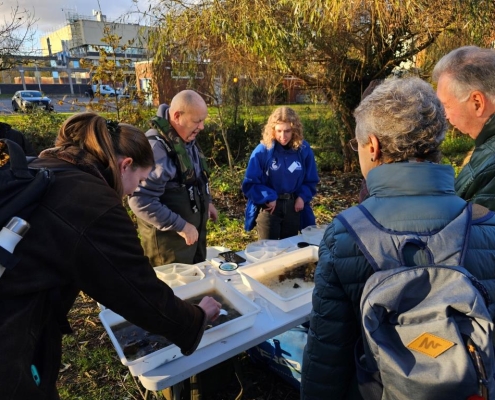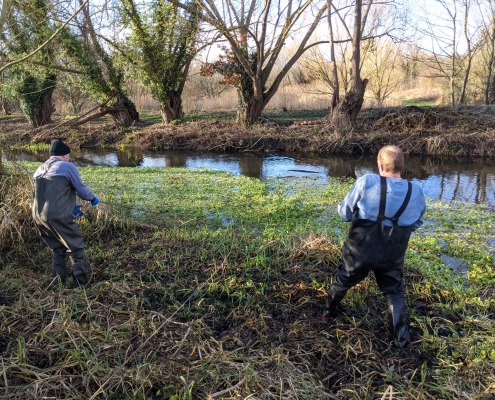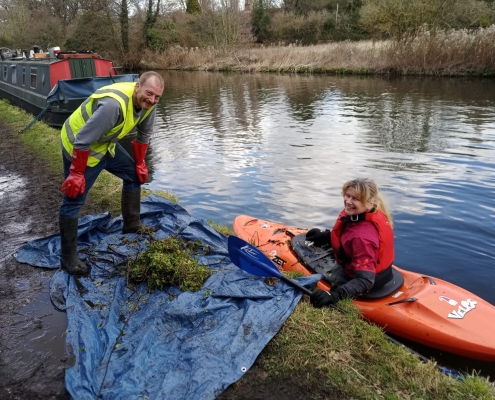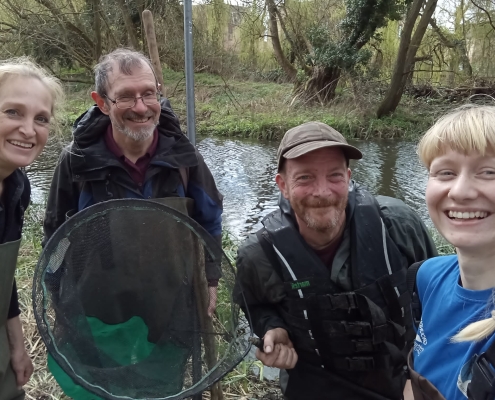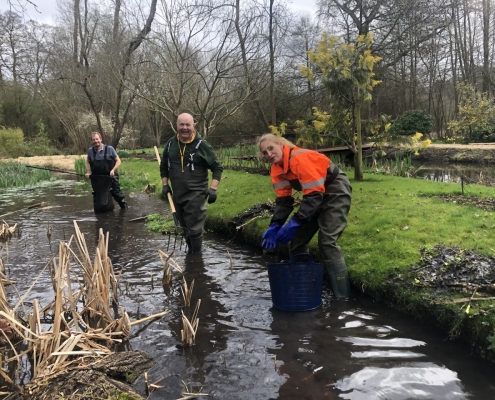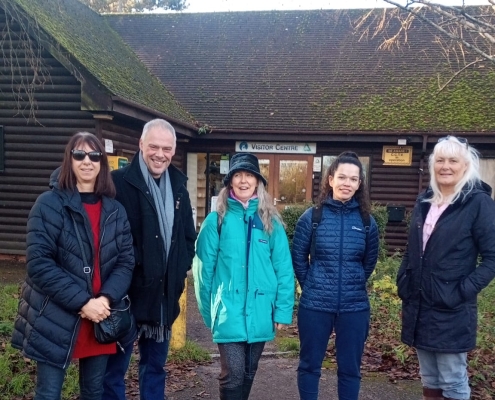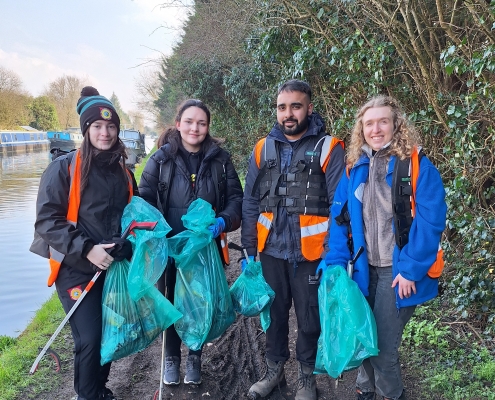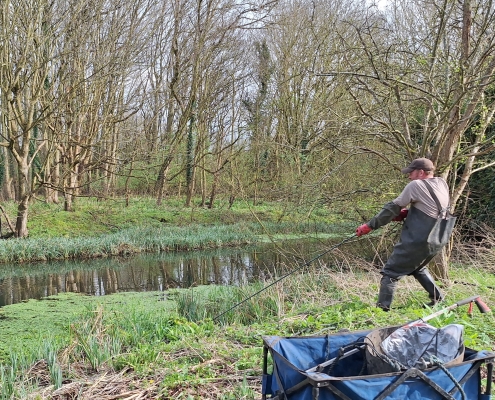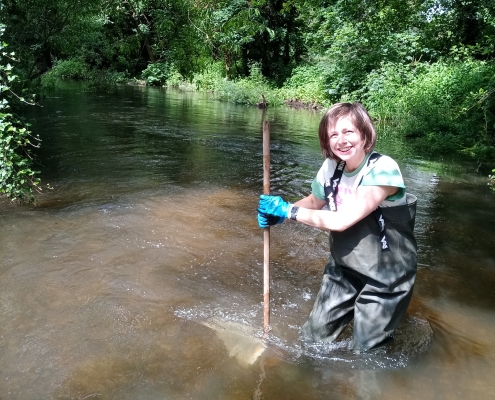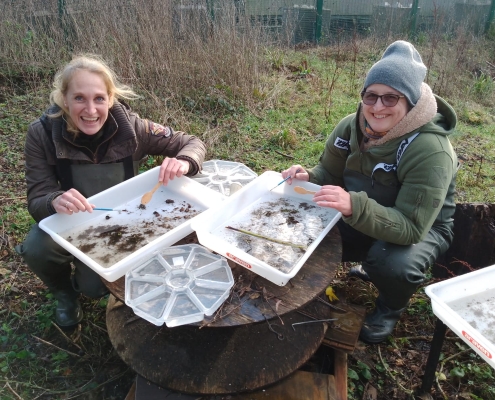Join The River Rangers: Help protect and restore our local rivers!
Our rivers and watercourses are facing unprecedented challenges from pollution, land use changes, wildlife loss, and climate change. Now more than ever, it’s crucial to take action to protect and improve these vital ecosystems. The River Rangers are a dedicated group of local volunteers working across the Colne Valley to conserve, monitor, and advocate for our rivers.
As a volunteer River Ranger, you’ll play a key role in supporting conservation projects, gathering data on river health, and raising awareness about the importance of our waterways. Your efforts will directly contribute to ongoing river restoration and monitoring efforts that would be difficult to achieve without the help of volunteers.
Flexible Volunteering Options: Whether you can spare two hours a month or just one day a year, there’s a volunteering opportunity that fits your schedule. Check out our volunteer opportunities below to see what types of options are available.
Sign up:
A registration form can be downloaded from the link below. Alternatively, fill out the form online here . Please send your registration form to [email protected]
Find out more about the River Rangers project and how it all started here.
About Us
What do the River Rangers do?
The River Rangers aim to support river conservation work throughout the Colne Valley Regional Park and the wider Colne Catchment. The overarching aim of the River Rangers is to protect, conserve and champion local watercourses. This involves contributing to work being done on various river conservation projects across the area, to read more about our current projects check out the our projects section. These projects focus on improving water quality, the river ecosystem, and improving wildlife monitoring.
Where did the River Rangers begin?
The River Rangers began as part of the Landscape Partnership scheme, funded from the Heritage Lottery, from 2019 – 2021. They were formed to aid in the work being done be the Colne Valley Regional Park and Colne Catchment in water quality monitoring, invasive species management and riverfly monitoring. Since they have started, the River Rangers have aided in monitoring of watercourses across the Colne Valley, and carrying out various river improvement works such as removing the invasive floating pennywort.
Who do we work with?
Work done on our rivers by the Colne Catchment, Colne Valley Regional Park and the River Rangers receives no core funding, meaning that to fund this work we must receive grants from other organisations we work with. Much of our funding is provided by The Environment Agency, Local Authorities, Water Companies as well as other companies such as Lush. We work collaboratively with others across the Colne Catchment, including angling clubs, councils, local wildlife trusts, landowners, water sports clubs and Brunel University.
Our Projects
The Rivers Team runs projects across the Colne Valley Regional Park area and into the wider Colne Catchment area. These projects are all part of our wider goals to protect, conserve and advocate for rivers throughout the Colne catchment for wildlife and people.
Pollution Monitoring
The pollution monitoring project aims to contribute to our ongoing work on monitoring and improving water quality. This project involves the production a map of all outfalls and pollution reports across the catchment, utilising multiple data sources and ongoing surveying. Volunteer pollution monitors survey local rivers near them to monitor for any pollution, and survey for this using our surveying form. By producing a map and encouraging pollution surveying, this will allow future efforts to improve water quality by solving issues at identified sites and directing efforts towards the worst affected areas.
Riverfly Monitoring
Riverfly monitoring is a national initiative set up by the Riverfly Partnership that involves surveying our rivers for small invertebrates and crustaceans that are key indicators of water quality. Riverfly monitoring occurs on every river throughout the Colne Catchment. By surveying riverflies on a monthly basis, we can establish data on the health of our rivers and report water quality incidents to the Environmental Agency. Volunteers are trained by the Riverfly Partnership to learn the surveying method and riverfly identification, before being assigned or set up at a site on a river near to them as part of a team of volunteers which will monitor this site. The aim of Riverfly monitoring is to collect long-term data on riverflies and water quality, so volunteers must be able to dedicate to long term volunteering at least once a month.
Floating Pennywort Removal
Floating Pennywort is a highly invasive plant species originally from South America that is prevalent across the Colne Catchment. The Rivers Team and the River Rangers aid in the management of floating Pennywort by supporting manual removal efforts. The aim of this project is to manage floating pennywort rafts across the catchment, minimise spread, and eventually eradicate it from the area. By doing this we can minimise the ecological and economic impacts of floating pennywort in the short term, and in the long term remove this stressor from the environment across the catchment. To find out more about the impacts of floating pennywort, check out our invasive species information page.
We work across areas throughout the Colne Catchment where floating pennywort is present to remove this invasive plant using any means possible. We are active on the Canal, the river Bulbourne, the river Colne and some of its tributaries where infestations of floating pennywort are present. To conduct these removal efforts we work with contractors, local canoe clubs, Canal and Rivers Trust, Boxmoor Wildlife Trust, Hillingdon Council, local angling clubs and the River Rangers. Volunteers often get involved from the banks and in the water, either manually hand picking pennywort out of the river or pulling rafts out using throwing anchors and rakes.
Currently, this project is focused on removal efforts in Denham Country Park along the stretch of the River Colne running alongside The Buckinghamshire Golf Club. This work will be conducted using contractors, due to the depth of the river and the extent of the infestation. However, future work is likely to span all the way up to Rickmansworth to completely clear this area of the Colne.
Biocontrol for Floating Pennywort and Himalayan Balsam
We are working with CABI on an exciting initiative trialling forms of biological control to manage the populations of invasive plants of Floating Pennywort and Himalayan Balsam in the Colne Catchment. Biological control refers to the introduction of herbivores or disease that specifically target the invasive plants that are causing problems. These forms of biological control have been carefully trialled and tested by CABI to ensure they are safe for release into the environment. They have the potential to save lots of money by reducing the need for physical removal efforts, so check out CABIs website for updates and to find out more about these initiatives.
Invasive species monitoring
To guide and inform our invasive species management across the Colne Valley, we also carry out invasive species monitoring. The goal of monitoring is to improve our ability to monitor current invasive species populations, identify new areas which have been invaded, and evaluate effectiveness of removal works. Additionally, by monitoring for invasive species we are able to better direct removal actions to areas which need them most. We are constantly looking to expand the areas we can monitor for invasive species, so please get in touch via [email protected] to volunteer to monitor an area near you.
Volunteering Opportunities
Fieldwork volunteer: Invasive species removal and general conservation activities
Join the river rangers as a fieldwork volunteer and aid in the work towards managing invasive species across the Colne Valley, alongside helping with occasional conservation activities. This can involve pulling Himalayan Balsam out of woodlands, removing floating pennywort from rivers, and general habitat management. Read more about our projects on the our projects section.
- Commitment & timeframe: Ongoing one-off events
- Location: Across the Colne Valley area
- Requirements: No previous experience is needed; however, we recommend that volunteers are physically capable to a level comparable to long periods of walking and heavy gardening work.
- Skill and development opportunities: knowledge of invasive species, tool use (including throwing anchors and rakes), experience working in water, teamwork skills, outdoor work experience and practical conservation experience
- Training and support available: Tool use training, water safety training, invasive species identification and management training, and support is available for transportation to events.
Riverfly monitor volunteer: Carry out monitoring of invertebrate wildlife in rivers to contribute to a national population monitoring initiative
Our riverfly monitors are a dedicated team of individuals monitoring river health across the Colne Valley. They are often focused on one or two sites close to them, where they carry out monitoring of riverfly populations in the river once a month. All riverfly monitors are provided with training, ongoing support and equipment to be given the skills and ability to conduct monthly surveys.
- Commitment & timeframe: Long term. A couple of hours once a month to complete a survey once you have completed training.
- Requirements: No previous experience is needed, although you will need to be physically capable of entering and exiting a river.
- Location: Across the River Colne.
- Skill and development opportunities: Species identification, surveying work, in river work, and teamwork.
- Training and support available: Riverfly Partnership Monitor training, extended riverfly training, and direct contact with the River Colne Riverfly Coordinator for setting up a site on the Colne alongside any other requests.
Surveyor: Help to conduct Invasive species and/or water quality surveying
We are eager to encourage more individuals to take on our surveyor volunteer opportunity. This involves walking along rivers in your local area to monitor invasive species presence or/and pollution in rivers. By contributing to this monitoring initiative this increases the quality and quantity of data collected across the Colne Valley, provides us with essential information for our invasive species and water quality projects, and allows us to direct our practical work to improve issues more effectively.
- Commitment & timeframe: Timings are flexible and based on surveyor’s schedule. Often Conducted independently or in pairs. Can be one off surveys or multiple, as then commitment level is dependent on individual.
- Requirements: No previous knowledge or experience is needed; individuals must be able to move around areas outside in nature on rough paths and own an be able to use a mobile smart phone.
- Location: Across the Colne Valley area
- Skill and development opportunities: Data collection, invasive species identification, pollution identification, and surveying experience.
- Training and support available: Training will be provided for how to conduct surveys and identify invasive species or pollution. Ongoing support will be provided following training for establishing monitoring routes and any other queries.
Events assistant: Provide a helping hand on event days, such as being responsible for taking photos, social media, monitoring and cleaning equipment
Many of our volunteer events are run by one Officer, so we are always on the lookout for volunteers which may be interested in seeing how events are run and contributing as an events assistant! This would provide first-hand experience in aiding in running events, such as helping set up prior to the event, taking photos, and managing equipment.
- Commitment & timeframe: Ongoing one of events, can be for a short or long-time frame.
- Requirements: No previous experience or knowledge needed. Must be physically capable of comfortably spending a day outside in nature.
- Location: Across the Colne Valley area
- Skill and development opportunities: Photography, social media marketing, events management, and equipment management.
- Training and support available: Training will be provided on how to aid in equipment management and procedures on the day. First hand support and guidance will be available from the rivers officer.
Enquires: We are open to other enquiries regarding volunteering
Volunteering FAQs
How do I hear about events or get involved in activities?
All of our volunteering events are advertised on the Colne Valley Eventbrite, and circulated in the River Rangers Newsletter, which you can sign up to by emailing [email protected] . Additionally, if you are interested in getting involved with surveying for invasive species, water quality or riverfly monitoring, please send an email to [email protected] and we can get you started in contributing to these opportunities.
I don’t have a car, how can I get to events?
For each event advertised on Eventbrite public transport options are included to advise how to get to different sites. We are aware that many sites are in isolated locations, so if you believe it will be challenging to reach a site please contact [email protected] and we can organise transportation for you.
Can I come to a volunteer session if I am under 18?
If you wish to volunteer and you are under 18, you must have a parent or guardian attend all sessions with you. Please inform us if this is the case.
I want to get involved but I don’t have anyone to go with?
Nearly all of our volunteers come along to sessions without having met others previously, we are all a friendly bunch and always happy to welcome new faces!
I don’t have any experience working outdoors, will I still be able to help?
Every pair of hands is helpful! You will gain experience as you go and we do not expect volunteers to know anything prior to events. Lots of guidance is available from our Rivers Officers, and if you have any questions never be afraid to ask!
I want to help but I have limited mobility/I am disabled?
We welcome everyone who would like to be involved in any of our projects. Please do let us know of any medical issues and how we can be accommodating, and we aim to provide a role for everyone who would like to help out.
Volunteer Resources
General Volunteer Resources
Invasive Species Resources
- Invasive species ID guides
- NNIS website
- INNS mapper
- Floating Pennywort surveying guide
- Floating Pennywort Map
- Guide to using the Floating Pennywort Map
Riverfly resources
